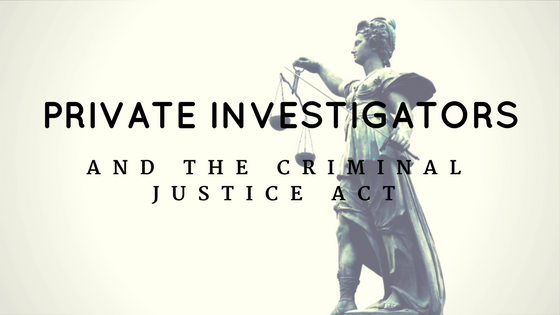
A little-known fact is that private investigators are available at no cost to indigent defendants charged with federal crimes. Private investigators can be a very important part of the defense. An estimated 85% of what occurs at a criminal trial directly results from work done outside of the courtroom. A defendant’s chance of being acquitted or having charges reduced is significantly increased when a private investigator is involved.
Right to Representation
The Sixth Amendment to the United States Constitution guarantees the rights of criminal defendants. Specifically, the accused has a right to representation by counsel in criminal proceedings. The Criminal Justice Act (CJA), enacted in 1964, established a system for appointing and compensating legal representation in federal criminal proceedings for persons financially unable to retain counsel on their own. The federal courts, recognizing the importance of private investigators to a criminal defense, established guidelines specifically addressing their availability and appointment for all defendants. Chapter 3 of the CJA Guidelines, along with 18 U.S. Code Section 3006A, authorizes an indigent defendant to petition the court and obtain a private investigator of the defendant’s choosing at no cost.
Vetting Private Investigators
Once the decision is made to engage a private investigator, counsel for the defense petitions the U.S. District Court to have their chosen private investigator appointed to their case. The U.S. District Court judge assigned to the case reviews the curriculum vitae of the private investigator and makes a finding as to the investigator’s ability to conduct criminal defense investigations. Vetting of the private investigator is critical – that ensures the defendant receives a licensed, trained and experienced professional.
Role of the Private Investigator
A private investigator assigned to assist the defense functions in the same capacity as the prosecution’s case agent(s). The investigator may conduct an independent review of all discovery material; conduct crime scene investigations; identify, collect and present evidence; locate and interview witnesses; assist with preparation for cross-examination; and testify regarding investigative efforts undertaken by the defense.
Conclusion
Well-documented evidence obtained by a private investigator can elevate a defendant’s position during negotiations and trial. Such evidence may very well make a crucial contribution to a favorable outcome for the defendant.
Private Investigator Steven Mason, Mason Investigative Solutions, is a former federal criminal investigator and has a wealth of investigative experience. Mr. Mason’s curriculum vitae has been vetted and accepted by the U.S. District Court for the District of Arizona, approving him to conduct federal criminal defense investigations.